-
Get Cloud GPU Server - Register Now!
Toggle navigation
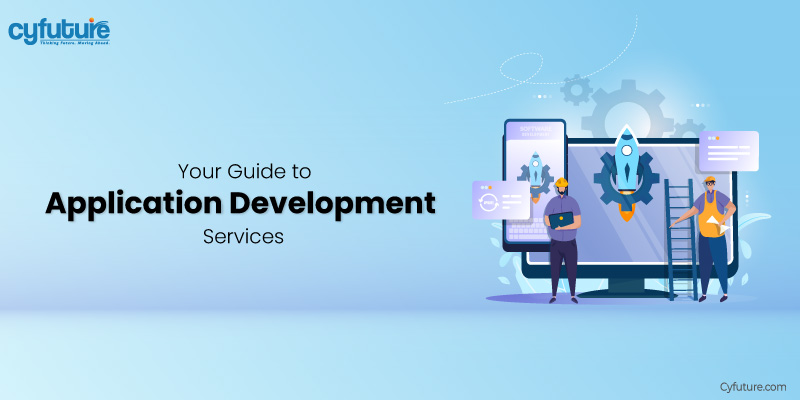
Welcome to the Cyfuture, where ideas take flight and lines of code transform dreams into existence.
In today’s tech-driven world, applications are the lifeblood of innovation, connecting businesses with their consumers and streamlining business operations.
Did you know that as of 2021, approximately 3.48 million apps were available for download on Google Play Store and another 2.22 million on Apple’s App Store?
This number may double by the end of 2023.
The numbers are staggering, reflecting the increasing demand for software solutions that cater to our evolving requirements. Each app represents not just lines of code but a unique journey that begins with a concept and culminates in a fully functional, user-friendly application.
Whether you’re a developing entrepreneur with a groundbreaking idea, an established business looking to digitize operations, or a curious tech lover eager to understand the magic behind your favorite apps, this blog is your interactive gateway to the world of Application Development Services.
It’s a space where we explore the development process, demystifying the complexities, celebrating successes, and learning from challenges.
So, fasten your seatbelts because we’re about to dive into a dynamic conversation about application development services, where your questions, insights, and experiences are not just welcome – they’re integral to the journey.
Let’s transform concepts into code and ideas into impactful applications together.
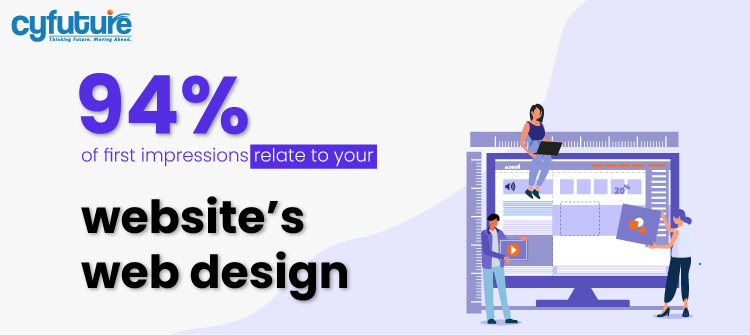
The expression “There’s an app for that” has become common in the quickly developing environment of technology and digitalization. Applications have changed how we live and work, from simplifying daily activities to reinventing whole sectors. However, behind every successful app is a complicated and sophisticated Application Development Services process. This multidimensional area includes the entire process from conception through deployment and beyond, acting as the digital era’s lifeblood.
Application Development Services (ADS) is the complete collection of procedures, tools, and techniques to develop software applications suited to individual demands and objectives. These services are critical in translating ideas into practical, user-friendly, high-performance apps that serve various purposes, from entertainment and communication to corporate operations and data analysis.
ADS is about utilizing code’s power to bring ideas to life. It entails careful planning, strategic design, coding, testing, and deployment while keeping to industry best practices and standards. This delicate dance of creativity and technical capability necessitates various skills, including programming knowledge, user experience (UX) design, quality assurance, and project management.
The demand for robust and innovative applications has never been more significant in the ever-evolving digital landscape. Whether you’re a business looking to streamline operations or an entrepreneur with a groundbreaking idea, the world of application development has a diverse array of offerings to cater to your specific needs.
Two crucial pillars stand out among these offerings: Web Design and Development Services and Business Application Development Services. Let’s discuss this in detail.
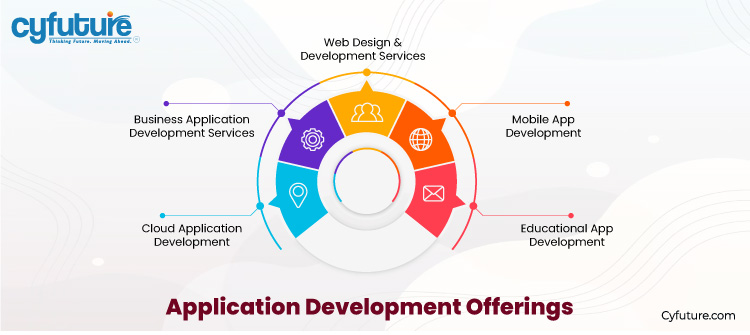
In today’s hyper-connected world, your website is frequently the initial point of contact between your company and its customers. It’s a virtual shop that may make or destroy your first impression on potential clients. Web Design and Development Services include the creation, design, and optimization of websites for both aesthetics and functionality. It encompasses everything from designing aesthetically attractive layouts to ensuring responsive design for a consistent user experience across several devices.
Web developers employ several programming languages, frameworks, and content management systems (CMS) to bring your digital presence to life. They manage the technical parts of your website, ensuring that it is visually appealing but also quick, safe, and user-friendly. Web Design and Development Services provide various solutions to meet your online objectives, from informational websites to e-commerce platforms.
While websites are necessary for building an online presence, business applications take functionality to an entirely new level. Business Application Development Services are concerned with developing software solutions suited to your unique operating requirements. Customer relationship management (CRM) systems, inventory management tools, employee portals, and data analytics dashboards are examples of these applications.
Customization is the key to successful commercial application development. Developers collaborate closely with your business to understand your specific needs and issues translated into real solutions. Connecting many software systems, automating repetitive operations, or utilizing data to make educated decisions.
Businesses may use Business Application Development Services to streamline operations, increase productivity, and remain competitive in a digital-first environment. They allow you to utilize technology to reach your company objectives fully.
Apart from web development and commercial application development, here are some more application development services:
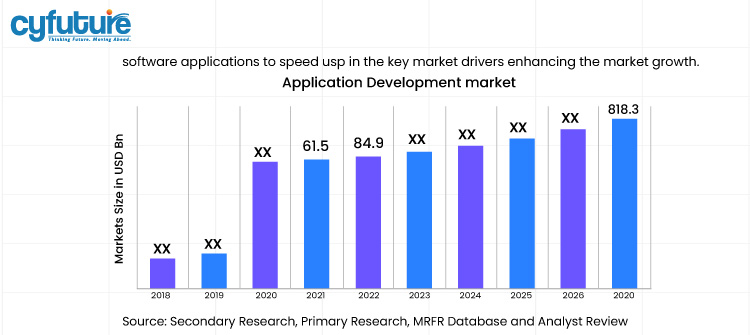
These elaborations provide a comprehensive understanding of the various stages and activities within the scope of Application Development Services. Each stage contributes to the successful planning, design, development, and support of applications to meet the client’s objectives.
For a better understanding, here is are breakdown of the scope of the application development service.
| Scope | Description | |
| Application Types | – Mobile Apps<br> – Web Applications<br> – Desktop Software<br> – Cross-platform Solutions<br> – Enterprise Applications<br> | |
| Industry Focus | – Healthcare<br> – Finance<br> – E-commerce<br> – Education<br> – Manufacturing<br> – Entertainment<br> – Real Estate<br> – Others | |
| Development Platforms | – iOS (Swift, Objective-C)<br> – Android (Java, Kotlin)<br> – Web (JavaScript, HTML, CSS)<br> – Windows (C#, .NET)<br> – Cross-platform (React Native, Flutter)<br> | |
| Services Offered | – Custom App Development<br> – UI/UX Design<br> – Prototyping<br> – API Integration<br> – Legacy System Migration<br> – Quality Assurance and Testing<br> – Maintenance and Support<br> – Consultation and Strategy | |
| Technologies Utilized | – Programming Languages (Python, Java, PHP, etc.)<br> – Front-end Frameworks (React, Angular, Vue.js)<br> – Database Systems (MySQL, PostgreSQL, MongoDB)<br> – Cloud Services (AWS, Azure, Google Cloud)<br> – DevOps Tools and CI/CD Pipelines<br> | |
| Specializations | – IoT Applications<br> – Blockchain Development<br> – AI and Machine Learning Integration<br> – Augmented Reality (AR) and Virtual Reality (VR)<br> – E-commerce Solutions<br> – Fintech Applications<br> – Healthcare IT Solutions | |
| Security and Compliance | – Data Encryption<br> – GDPR and HIPAA Compliance<br> – Penetration Testing<br> – Regular Security Audits<br> – Secure Data Handling<br> | |
| Scalability | – Scalable Architectures<br> – Load Balancing<br> – Elastic Scaling<br> – Performance Optimization<br> | |
| Project Size and Complexity | – Small to Large-scale Projects<br> – Simple to Complex Applications<br> – MVP Development<br> | |
| Client Engagement | – Collaboration and Communication<br> – Feedback and Iteration<br> – Transparent Project Tracking<br> | |
| Budgeting and Pricing Models | – Fixed Price<br> – Time and Material<br> – Milestone-based Payments<br> – Retainer Contracts<br> | |
| Project Delivery Timeframes | – Varies by Project Complexity<br> – Agile Development (Sprints)<br> – Timely Updates and Milestone Deliveries<br> | |
| Post-launch Support and Updates | – Ongoing Maintenance<br> – Bug Fixes and Patch Management<br> – Feature Enhancements<br> – 24/7 Support (if offered)<br> | |
| Legal and Confidentiality Aspects | – Non-Disclosure Agreements (NDAs)<br> – Intellectual Property Rights<br> – Legal Contracts and Service Level Agreements (SLAs)<br> – Client Data Protection<br> – Dispute Resolution Mechanisms<br> |
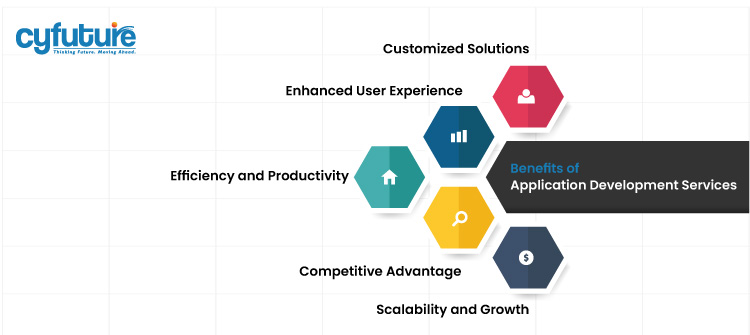
Now, let’s discuss the top 5 benefits of Application Development Services:
Application Development Services, including Web Design and Development Services and Business Application Development Services, offer the advantage of tailoring solutions to meet specific business needs. With custom web design and development, businesses can create websites and web applications that align perfectly with their branding, functionality requirements, and user preferences. This customization ensures the final product is unique and optimized for the target audience.
Web designers create visually appealing and user-centric interfaces that resonate with the brand’s identity. Developers build websites and web applications with features and functionalities that cater to the business’s objectives. This customization enhances the user experience, fosters brand loyalty, and improves conversion rates.
These services specialize in developing custom software applications tailored to the unique requirements of a business. Whether it’s a CRM system, inventory management software, or a workflow automation tool, business application development ensures that the software aligns with the organization’s processes, helping to improve operational efficiency and productivity.
Web Design and Development Services are crucial in creating a positive user experience. A well-designed website or application is not only visually appealing but also intuitive and user-friendly.
Web designers optimize the layout, navigation, and overall user interface to provide a seamless and enjoyable browsing experience. It leads to higher user engagement, reduced bounce rates, and increased time spent on the website.
In business applications, user experience design ensures employees can easily navigate and use the software to perform their tasks efficiently. This results in a more productive workforce and fewer errors in daily operations.
Business Application Development Services are instrumental in streamlining business processes and improving efficiency. Custom business applications are designed to automate tasks, manage data efficiently, and optimize workflows.
These services specialize in creating software solutions that address specific business challenges. For example, a custom CRM (Customer Relationship Management) system can centralize customer data, automate sales processes, and provide valuable insights. This efficiency reduces manual workloads, improves accuracy, and better resource allocation.
Application Development Services, especially when combined with Web Design and Development Services, can provide a significant competitive advantage.
A professionally designed and user-friendly website sets a business apart from competitors. It not only attracts and retains customers but also communicates trust and credibility. A well-designed website can differentiate a business in a crowded online marketplace.
Custom business applications often offer unique features and capabilities not found in off-the-shelf solutions. This uniqueness can be a key differentiator in industries where efficiency, data management, and customer service are paramount.
As businesses grow, they need scalable solutions that can adapt to changing demands and increased user loads.
Professional web design and development ensure that websites can handle increased traffic and content as the business grows. Scalability is built into the architecture to accommodate future expansion without the need for a complete overhaul.
Custom business applications can be modified and expanded to meet evolving business needs. This scalability ensures that technology supports, rather than hinders, business growth and innovation.
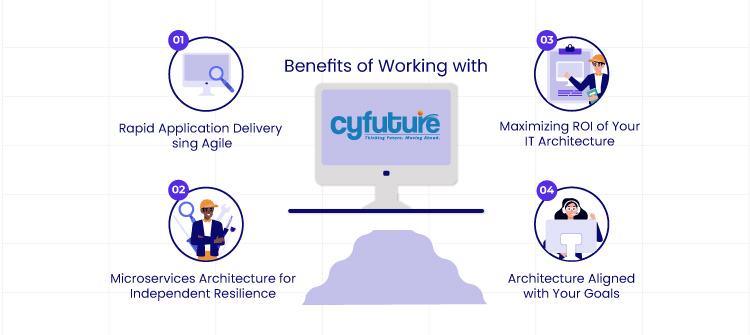
Here are the reasons why choosing Cyfuture for application development services is a wise decision:
In choosing Cyfuture for your application development needs, you’re not only gaining a development partner but a strategic ally dedicated to delivering value, speed, resilience, and alignment with your business objectives.
Our commitment to maximizing ROI and our expertise in Agile and microservices architectures make us a reliable choice for businesses seeking to excel in today’s competitive landscape.
As we draw the curtains on this informative blog, we sincerely hope that you’ve found the entire content to be enlightening and valuable. If you’ve diligently read from start to finish, it’s likely that you’ve acquired fresh insights into the world of application development services.
However, if you still have lingering questions or require further clarification on any aspect discussed in this blog, please don’t hesitate to get in touch with our team of seasoned experts. At Cyfuture, we are dedicated to leaving no stone unturned when it comes to fulfilling our client’s needs and requirements. We pride ourselves on providing top-notch support and assistance to ensure your journey in the realm of application development is as smooth and successful as possible.
Feel completely free to reach out to our support team at any time. Your inquiries and concerns are always welcomed, and we’re here to guide you every step of the way. Your success is our priority, and we look forward to assisting you on your path to realizing your application development goals.
How long does it take to develop an app from concept to code?
The development timeline varies depending on the complexity of your app and the resources available. On average, it can take anywhere from a few months to a year or more.
What skills should I look for in a development team?
A strong development team should have expertise in programming languages, app design, quality assurance, and project management. Communication and collaboration skills are also essential.
How can I market my app effectively?
Effective marketing involves a combination of strategies, including social media promotion, email marketing, content creation, and app store optimization (ASO).
What is the significance of user feedback?
User feedback is invaluable for identifying areas of improvement and enhancing the user experience. It helps you make data-driven decisions.
What are the common monetization strategies for apps?
Common monetization strategies include in-app advertisements, in-app purchases, subscription models, and selling the app itself.
How can I protect user data and ensure security?
To protect user data and ensure security, employ robust encryption, regular security audits, and compliance with data protection regulations.